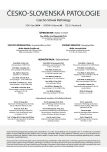Hereditary thyroid carcinoma and its molecular diagnostics
Authors:
Šárka Dvořáková; Eliška Václavíková; Vlasta Sýkorová; Tereza Hálková; Běla Bendlová
Authors‘ workplace:
Oddělení molekulární endokrinologie, Endokrinologický ústav, Praha
Published in:
Čes.-slov. Patol., 50, 2014, No. 2, p. 81-86
Category:
Reviews Article
Overview
Thyroid carcinoma is the most common malignancy of the endocrine system and its incidence is still growing. The majority of thyroid tumors occur in sporadic form, however, some are inherited in families. The carcinomas can be divided into two groups according to the types of thyroid cells. Medullary thyroid carcinoma is derived from parafollicular C-cells. 20 - 25% of medullary thyroid carcinomas are inherited in multiple endocrine neoplasia type 2 syndromes. Genetic causes are activated by germ-line mutations in the RET proto-oncogene, which are transmitted autosomal, dominantly. At present the routine genetic screening and presymptomatic treatment (i.e. prophylactic total thyreoidectomy) on the basis of genotype-phenotype correlation has already been developed. The second group consists of carcinomas derived from follicular cells of thyroid that can be divided into differentiated (papillary and follicular) and nondifferentiated (anaplastic and poorly differentiated) ones. Also in this group 5-15% of carcinomas are cases of different familial syndromes (Gardner, Cowden, Werner syndromes and Carney complex) or only simple familial papillary thyroid carcinoma. Although the genetic basis of inherited cancer syndromes are mostly known (APC, PTEN, PRKAR1α and WRN genes), the cause of nonsyndromic familial papillary thyroid carcinoma is still under investigation, several predisposition genetic loci are recognized.
Keywords:
Medullary thyroid carcinoma – MEN2 syndrome – thyroid carcinoma – genetics – RET-proto-oncogene
Sources
1. Bendlová B, Dvořáková Š, Sýkorová V, Václavíková E, Hálková T. Nádory štítné žlázy – molekulárně genetické příčiny a možnosti cílené léčby. Čas Lék čes 2012; 151 : 123-127.
2. Lodish M. Multiple endocrine neoplasia type 2. In: Stratakis CA, ed. Endocrine Tumor Syndromes and Thein Genetics. Bethesda, Md.: Frontiers of Hormone Research, editor AB Grossman, vol. 41, 2013 : 16-29.
3. Moore SW, Zaahl M. The Hirschsprung‘s-multiple endocrine neoplasia connection. Clinics (Sao Paulo) 2012; 67 Suppl 1 : 63-67.
4. Wagner SM, Zhu S, Nicolescu AC, Mulligan LM. Molecular mechanisms of RET receptor-mediated oncogenesis in multiple endocrine neoplasia 2. Clinics (Sao Paulo) 2012; 67 Suppl 1 : 77-84.
5. Raue F, Frank-Raue K. Genotype-phenotype correlation in multiple endocrine neoplasia type 2. Clinics (Sao Paulo) 2012; 67 Suppl 1 : 69-75.
6. Schlumberger M, Massicotte MH, Nascimento CL, Chougnet C, Baudin E, Leboulleux S. Kinase inhibitors for advanced medullary thyroid carcinoma. Clinics (Sao Paulo) 2012; 67 Suppl 1 : 125-129.
7. Bendlová B, Dvořáková Š, Sýkorová V, Hálková T, Václavíková E. Genetika nádorů štítné žlázy a jejich molekulárně cílená léčba. Onkologie 2011; 5(6): 325-328.
8. Ferreira CV, Siqueira DR, Ceolin L, Maia AL. Advanced medullary thyroid cancer: pathophysiology and management. Cancer Manag Res 2013; 5 : 57-66.
9. Imyanitov EN, Byrski T. Systemic treatment for hereditary cancers: a 2012 update. Hered Cancer Clin Pract 2013; 11(1): 2.
10. Albright F, Teerlink C, Werner TL, Cannon-Albright LA. Significant evidence for a heritable contribution to cancer predisposition: a review of cancer familiality by site. BMC Cancer 2012; 12 : 138.
11. Nosé V. Familial thyroid cancer: a review. Mod Pathol 2011; 24 Suppl 2: S19-S33.
12. Mazeh H, Sippel RS. Familial nonmedullary thyroid carcinoma. Thyroid 2013; 23(9): 1049-1056.
13. Morrison PJ, Atkinson AB. Genetic aspects of familial thyroid cancer. Oncologist 2009; 14(6): 571-577.
14. Kacerovská D, Michal M, Šíma R, Grossmann P, Kazakov DV. Carneyho komplex. Cesk Patol 2011; 47(4): 192-197.
15. Espiard S, Bertherat J. Carney Complex. In: Stratakis CA, ed. Endocrine Tumor Syndromes and Thein Genetics. Bethesda, Md.: Frontiers of Hormone Research, editor AB Grossman, vol. 41, 2013 : 50-62.
16. Son EJ, Nosé V. Familial follicular cell-derived thyroid carcinoma. Front Endocrinol (Lausanne) 2012; 3 : 61.
17. Bauer AJ. Clinical behavior and genetics of nonsyndromic, familial nonmedullary thyroid cancer. In: Stratakis CA, ed. Endocrine Tumor Syndromes and Their Genetics. Bethesda, Md.: Frontiers of Hormone Research, editor AB Grossman, vol. 41, 2013 : 141-148.
18. Máximo V, Lima J, Prazeres H, Soares P, Sobrinho-Simões M. The biology and the genetics of Hurthle cell tumors of the thyroid. Endocr Relat Cancer 2012; 19(4): R131-R147.
Labels
Anatomical pathology Forensic medical examiner ToxicologyArticle was published in
Czecho-Slovak Pathology

2014 Issue 2
-
All articles in this issue
- WHO classification of tumours of soft tissue and bone 2013: the main changes compared to the 3rd edition
- Molecular pathology of pulmonary carcinomas
- Gastrointestinal stromal tumor (GIST): Advances in 2013
- Hereditary thyroid carcinoma and its molecular diagnostics
- Where does Ewing sarcoma end and begin - two cases of unusual bone tumors with t(20;22)(EWSR1-NFATc2) alteration
- Epidermolytic hyperkeratosis of the vulva associated with basal cell carcinoma in a patient with vaginal condyloma acuminatum and vaginal intraepithelial neoplasia harboring HPV, type 42
- Use of archival formalin-fixed, paraffin-embedded (FFPE) tissue samples for molecular genetic analysis in diffuse large B-cell lymphoma (DLBCL)
- The current staging for uterine body malignancies and its importance for clinical practice
- Czecho-Slovak Pathology
- Journal archive
- Current issue
- About the journal
Most read in this issue
- WHO classification of tumours of soft tissue and bone 2013: the main changes compared to the 3rd edition
- Where does Ewing sarcoma end and begin - two cases of unusual bone tumors with t(20;22)(EWSR1-NFATc2) alteration
- The current staging for uterine body malignancies and its importance for clinical practice
- Epidermolytic hyperkeratosis of the vulva associated with basal cell carcinoma in a patient with vaginal condyloma acuminatum and vaginal intraepithelial neoplasia harboring HPV, type 42
